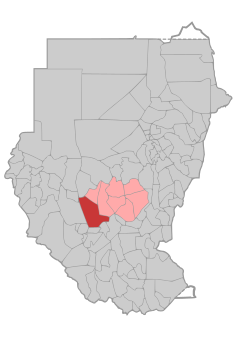| UN Security Council Resolution 1990 | ||
|---|---|---|
 Disputed Abyei region (dark red) in South Kordofan | ||
| Date | 27 June 2011 | |
| Meeting no. | 6,567 | |
| Code | S/RES/1990 (Document) | |
| Subject | The situation in Sudan | |
Voting summary |
| |
| Result | Adopted | |
| Security Council composition | ||
Permanent members | ||
Non-permanent members | ||
| ||
United Nations Security Council Resolution 1990, adopted unanimously on June 27, 2011, after recalling all previous resolutions on the situation in Sudan and the Comprehensive Peace Agreement, the Council established the United Nations Interim Security Force for Abyei (UNISFA) in the disputed Abyei region between Sudan and South Sudan. [1]
Contents
The resolution was passed after a conflict between the Sudan People's Liberation Army/Movement (SPLA/M) and Sudanese army in the South Kordofan region, and in the run-up to the declaration of independence by South Sudan from the north. [2] The resolution was drafted by the United States. [3]